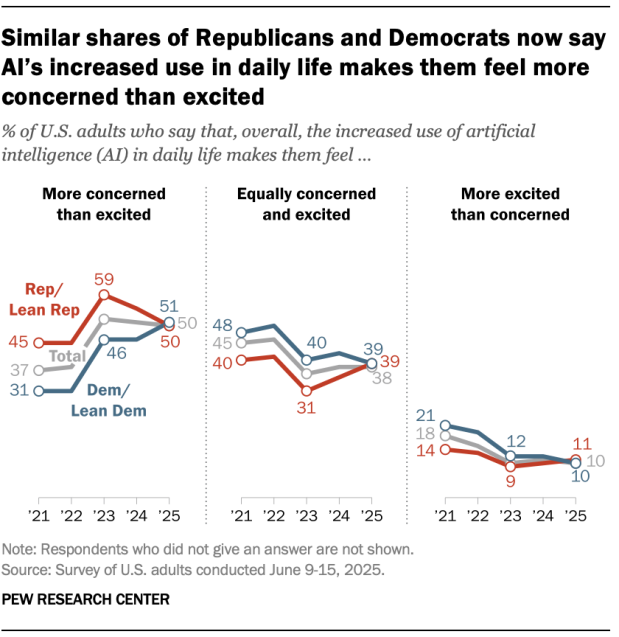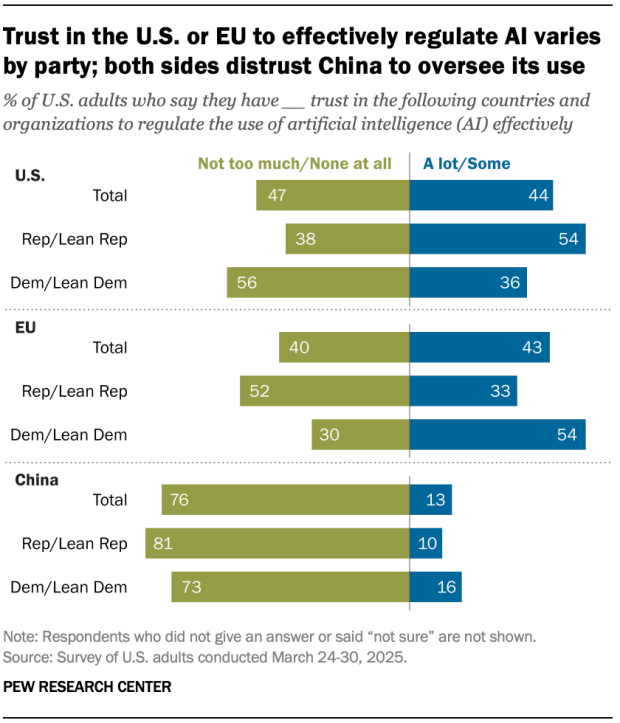Republicans and Democrats are now about equally likely to express concern over the increased use of artificial intelligence, but they differ widely in their trust in the United States to regulate the technology.

Today, nearly identical shares of Republicans and Democrats say they are more concerned than excited about the increased use of AI in daily life – 50% and 51%, respectively, according to a Pew Research Center survey of U.S. adults conducted in June. (In this analysis, Republicans and Democrats include independents who lean toward each party.)
Republicans and Democrats similarly report feeling equally concerned and excited about the increased use of AI, while about one-in-ten in each group are more excited than concerned.
This represents a notable shift from previous years. Since 2021, Republicans have been more likely than Democrats to say they feel more concerned than excited about AI’s growing use. But the share of Republicans who say this has decreased 9 percentage points since 2023.
Meanwhile, Democrats’ concerns over AI have steadily grown. The 51% of Democrats who are more concerned than excited about AI’s increased use in daily life is up from 46% in 2023 and 31% in 2021.
Overall, Americans have grown more concerned than excited over the increased use of AI, with half saying this today, up from 37% in 2021.
How Americans view AI regulation by the U.S. and other entities
While some advocates push for stricter rules on AI, others have cautioned against stifling innovation. California recently became the first state to regulate chatbots, fueling discussion about the future of AI laws.

Americans are fairly divided on whether they trust the U.S. to regulate AI effectively, according to a separate Pew Research Center survey conducted in March. Overall, 44% say they trust the U.S. a lot or some to regulate the use of AI effectively, while 47% have little to no trust in the U.S. to do this.
Related: How People Around the World View AI
The survey also asked Americans whether they trust the European Union and China to regulate AI properly. While Americans are divided in trusting the EU, far fewer trust China to regulate AI effectively.
How views of AI regulation differ by party
Republicans are more likely than Democrats to trust the U.S. to regulate the use of AI effectively. Just over half of Republicans (54%) say they trust the U.S. to effectively regulate AI, compared with about a third of Democrats (36%). By contrast, more Democrats than Republicans distrust the U.S. to oversee this technology (56% vs. 38%).
This pattern is reversed when it comes to the EU regulating AI. While 54% of Democrats say they trust the EU to regulate the use of AI effectively, a third of Republicans say the same. In other words, Democrats are more likely to trust the EU than their own country to regulate AI.
Republicans and Democrats alike are skeptical of China’s ability to regulate AI. Across both parties, majorities say they distrust China’s ability to oversee this technology properly. Still, distrust is higher among Republicans than Democrats (81% vs 73%).

